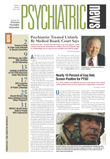About one-third of infants in a recent study who were exposed to antidepressants while in the womb experienced symptoms of neonatal abstinence syndrome, which include tremors, disturbed sleep, gastrointestinal problems, and hypertonicity.
Most of the symptoms occurred within the first 48 hours after birth, but the long-term effects of neonatal abstinence syndrome, if any, are unknown, according to a report in the February Archives of Pediatric and Adolescent Medicine.
Researchers from the Schneider Children's Medical Center of Israel studied 120 infants born at the Rabin Medical Center in Israel between January 2002 and August 2004.
Half of the infants in the sample were born to mothers who took one of the selective serotonin reuptake inhibitors (SSRIs) either through the entire pregnancy or during the last trimester.
Of the mothers who took SSRIs, 37 took paroxetine, 12 took fluoxetine, eight took citalopram, two took venlafaxine, and one took sertraline.
The remaining 60 infants were born to mothers who did not take an SSRI during pregnancy.
Researchers assessed the infants' health with blood tests and by monitoring cardiorespiratory functioning and temperature. In addition, they used the Finnegan Scale, which measures symptoms of neonatal abstinence syndrome (NAS).
Abstinence Syndrome Found
Of the 60 infants exposed to SSRIs in utero, 30 percent (18) exhibited symptoms of NAS. None of the infants in the control group exhibited symptoms of NAS.
When researchers measured severity of symptoms among the 18 NAS infants, they found that eight had severe symptoms and 10 had mild symptoms. Six of the eight infants with severe symptoms had been exposed to paroxetine in utero.
In addition, three of the infants exposed to SSRIs for the complete pregnancy had major congenital anomalies, including ventricular septal defect, hydronephronsis, and cleft palate. One of the newborns in the control group had hydronephronosis.
Gil Klinger, M.D., one of the study's investigators, told Psychiatric News that most of the mild symptoms in newborns subsided within a few days. “Of the severely affected infants, two had seizures, which resolved without intervention.” Klinger is a senior neonatologist at Schneider Children's Medical Center.
Though none of the short-term symptoms were life-threatening, he said,“ the long-term effects of SSRIs on newborns are unknown.”
Klinger acknowledged that “depression also entails a risk to a pregnant woman and her fetus and should also be controlled—we are not recommending discontinuation of medications during pregnancy; however, sometimes SSRIs are given for very mild indications, and in these circumstances the risk-benefit ratio may not be in favor of giving antidepressants.”
Other Study Finds Risk Minor
In other research, a case-controlled study published in February revealed a slight risk of a relatively serious health problem for newborns of mothers taking antidepressants during late pregnancy.
Researchers found that mothers who took SSRIs after the 20th week of gestation were six times as likely as those who did not take the antidepressants in late pregnancy to have newborns with persistent pulmonary hypertension.
Researchers recruited a sample of 377 women whose infants had pulmonary hypertension and 836 control women and their healthy infants from nearly 100 medical centers in Boston, Philadelphia, San Diego, and Toronto from 1998 to 2003. They gathered information on the mothers' medical and obstetrical histories and past antidepressant usage. They assessed infants for pulmonary hypertension.
The researchers found that 14 infants with pulmonary hypertension had been exposed to an SSRI during late pregnancy, while only six infants in the control group—those without the condition—had been exposed to SSRIs.
When researchers analyzed the association between SSRI use anytime during pregnancy and pulmonary hypertension in newborns, however, they found no elevated risk. Only use of SSRIs after the 20th week of gestation was significantly associated with pulmonary hypertension.
According to the report in the February 9 New England Journal of Medicine, newborns with the condition “are typically full-term or near-term infants without associated congenital anomalies who present shortly after birth with severe respiratory failure requiring intubation and mechanical ventilation.”
Christina Chambers, Ph.D., M.P.H., the study's lead investigator, emphasized that the relative risk for infants is low—only about 6 to 12 women per 1,000 who use SSRIs late in pregnancy will have babies with pulmonary hypertension. “About 99 percent of women exposed to one of these medications late in pregnancy will deliver an infant unaffected by pulmonary hypertension,” she told Psychiatric News.
Chambers is an assistant professor of pediatrics at the University of California, San Diego School of Medicine.
Though the findings could not prove a causal association between fetal exposure to SSRIs and pulmonary hypertension, Chambers noted that one effect of SSRIs is to reduce the production of nitric oxide, a vasodilator.“ SSRIs also boost levels of serotonin,” she added, “which has vasoconstrictive properties.”
Chambers also noted that even though there is low risk of pulmonary hypertension among newborns of mothers who take SSRIs late in pregnancy, the finding “should be factored into the many things an expectant mother must consider when she is deciding whether to take an SSRI during pregnancy.”
Arch Pediatr Adolesc Med 2005 160 173
N Engl J Med 2005 354 579
